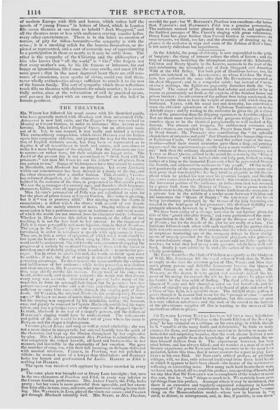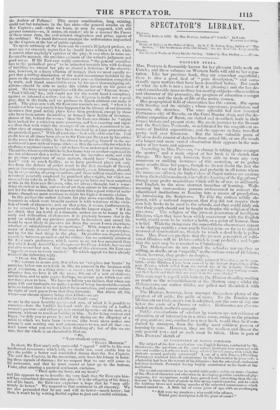fur Eowann LYTTON Bi•LIVEll lias been led into a most
injudicious proceeding. By way of "Preface to the Fourth Edition of' the Stu Cap- tain," he has ventured on a critique on his own play, in -which, though he is " sensible of the many faults and deficiencies," he finds so many excuses for them, and moreover takes occasion to develop so many un- looked-for aml surprising beauties, that the work almost derives a new interest for the public from the knowledge of the gratification the au- thor himself derives from it. The experiment, however, has been tried before, and has always failed; and we wonder at a man of so much literary experience as Sir EDWARD having recourse to it—he must have gathered, before this time, that it never answers fur a poet to play LON. (ANUS to his own Iliad. Sir 1:myelin's critical preface, or prefatory critique, will, we fear, only rebound ineffectual from those hard hearts at which it appears to have been aimed—the hearts of the reviewers softening or converting none. How many such hard hearts there were, we knew not, indeed, till we read this preface; nor, speaking of hearts, ba.d we any idea that Sir Enwmin's was so completely of the tender or sensi- tive sort, that he "took" things so much to it. We certainly learn seve- ral things from this preface. Amongst others it may be mentioned, that there is an extensive and regularly-orgauized conspiracy in London, composed of" the general contributors to the periodical press"—some- thing on the Monmouthshire model—whose vow in heaven is, " to cavil, to distort, to misrepresent, and, in fine, if possible, to run down"
• the Author of Pelham! This secret combination, long existing, could not but terminate in the late riots—the general attacks on the Sea Captain ; and—what we learn, as may be supposed, with still greater concern—we, it seems, oh reader are in a manner the FROST of these same riots, the evil-minded riugleaders and prime agents of the sedition ! We stand foremost amongst the unfortunates impeached by the Captain at the bar of public opinion.
To speak seriously of Sir EowA an Ilutovsnt's ill-judged, preface, we must say we sincerely regret that he ehould have written it ; for, while it cannot alter anybody's opinion of the play, it may alter, in some un- fhvourable manner, the previous estimate of the writer's judgment and good sense. If Sir EuwAno really conceives " the general contribu- tors to the periodical press " to be animated towards him with feelings of hostility, we cannot but pity so absurd a delusion; if the observa- tion, however, is a hasty effusion of temper, then we must equally 1,2- gra that a trifling diminution of the usual encomiums lavished by the press on the productions of Sir EnwAnn's pen—a diminution compelled by truth, and found unavoidable even by his most thoroughgoing ad- mirers—should be able to make this visible inroad on his peace of mind. "W e have many sympathies with the author of " Eugene Aram," " Paul Clifford," &e., and would not fir the world head a conspiracy against so talented a writer : but the .tica Captain is really not a good play, that is the truth, and no prefaces to fourth editions can make it good. The piece aets well, Sir IlowAun reminds us ; and, " when it is considered how very rarely it has happened in the history of our dramatic literatuve that good acting plays have been produced, except by those who have been actors themselves or formed their habits of literature, almost of life, behind the scenes." then Sir EowAnn thinks he " might have looked for a cruonsm more generous, and less exacting and rigor- ous than that with which the attempts of an author, accustomed to an- other class of composition, have been received hy a large proportion of the periodical press." With all tenderness be it said—this won't do. Full credit has at all times been given to Sir Eow.ton Ilui.wgit by his critics in the press tbr the ability be has shown in adapting himself to the ne- cessities of a new style of composition : so that the versa Witty for which he challenges applause cannot be said to haye been underrated or forgotten. The public, whose spoilt child he is.has in one way or another expressed its due astonishment that a writer inured to the narrative style, and with no previous experience of stage matters, should have " changed his hand" with so much facility, as to have produced plays not only free front the defects of action usual in the first attempts of literary men at drat oatie composition, but particularly, even falsomely, abound- ing in stage-tricks, claptrap situations, and those telling expedients and resources generally employed by practised playwrights, but which no- vices seldom take to at first. We tbr our paths have not been surprised at this in Sir Enwrinn 13ta.wEn, who, we always thought, had a some- thing theatrical in him, and more of art than nature in his composition ; and it is for this reason that we sincerely think him a good writer of melo- drama though we must continue to doubt his higher dramatic claims.
In this preface the author defends his play more especially from the imputations which were brought against it with reference to the viola- tion of truth of character ; and on that point, it seems, (unfortunately, as we conceive,) he is prepared to stake his largest wager. " If I do not think that my limbs as a dramatic author are to be found in the study and delineation of character, it is precisely because that is the point on which all my previous pursuits in literature and actual life would be most likely to preserve me from the errors I own elsewhere, whether of misjudgment or inexperience." With respect to the cha- racter of Lath, Arundel. Sir EnwAnn looks upon it as a masterpiece, and by far the best thing in the play. De gnsiihus non di.sputaminnt, especially between an author and his critics ; but we certainly admire at Sir lo w.kun's preference, -which seems to us not less unnatural than that i 1i.h Lady Arundel her,711'cxpre,,,,es for Privy Asitda/c, her second and ab,o si'nut-best son. For the truth of this character, Sir EDWARD " appeels ;it once to every mother." To whieh appeal we have already received the following reply.
" Diet It SIR EDWARD, "We venture to assure you, that when we misplace our hearts' by
marryiog fielow our own rank in life, -we proceed in the business with gis at resolution, as a thing done in aware ; and, far front loving the offspring /cgs, we love it all the more, Sir, out of a sort of obstioate satisibetion, and to spite papa—feelings, we assure you, which can add new Ogee even to love. We have to inform you further, that when our Papas kill our husbands, we make a point of hobos inconsolable—much more so indeed than if we bad killed them ourselves, and cannot endure the sight of such papas front that time 1hrwards. But above all, Sir, when—our chosen spouses being thus killed—we are Forced. to a lordlier husband's arms,'
we are in the most horribly aggravated state of mind it is possible to conceive—hate the lordlier husband with the intensity of a battled woman's passion—and either go .oto eternal hysterics on the spot, or a nunnery, withont so much as looking at hint. As the being content and happy, we defy you to prove it ; and for doting on the offspring of a Union to which we have been ronesat,' (the word alone makes one scream !) and sending our real pionas onowis to sea, and all that—we don't know what you can have been thinking of ; but of this we are sure, that the whole is an abominable libel on, "Sir, " Your obedient servants,
" EVERY MOTHER." In short, Sir EowArtn's only successful " appeal " will be to his own intellectual resources ; which will, We doubt not, soon enable him to give the public a better and truthfuller drama than the Sea Captain. The said Sea Capt«in, in the mean time, only loses his labour in hoist- ing these signals of distress ; for we suspect that no one will come to Ins assistance, and that he must sooner or later go to the bottom. after uttering a poetical sentiment, exclaims,
" There spoke my fancy, not my heart ;" and this appears to us to describe the very fault that Sir EowAnn him- self has committed throughout this play—it is the offspring of his fancy, not of his heart. Sir EDWARD expresses a hope that he "may ulti- mately do better." We respond to that sentiment in all sincerity. We are also persuaded that he can and will do better—much better ; but then, it won't be by writing fretful replies to just and candid criticism.



























 Previous page
Previous page